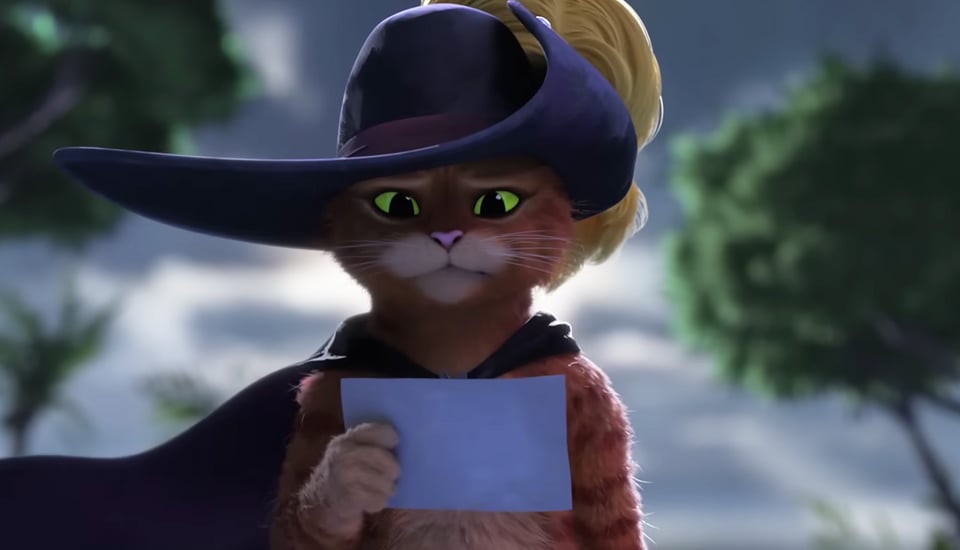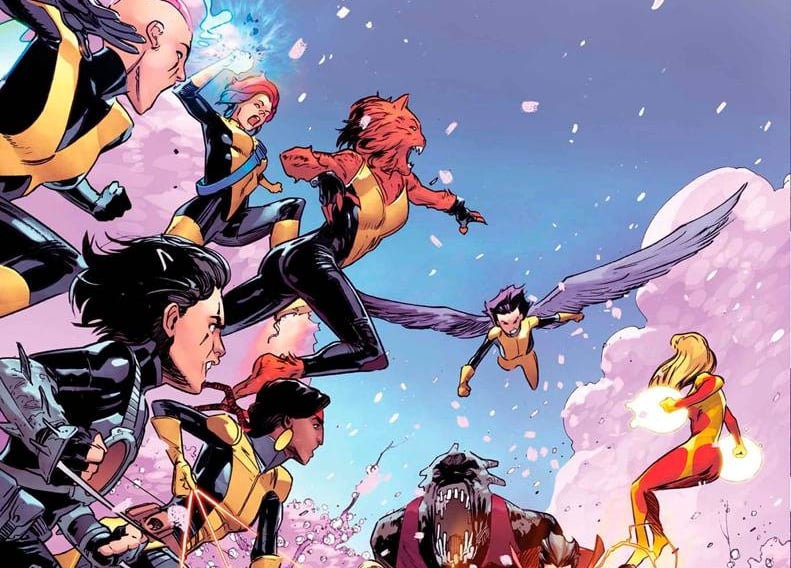Puss in Boots: The Last Wish Is The Best Superhero Movie Ever

No, seriously. I am going to fire up this hot take — and I might even convince you that I'm right.
So I finally watched Puss in Boots: the Last Wish, because it was on Netflix and I think it was about to go away. And... it was as good as everybody in the world said it was. It's been about a week and I haven't been able to stop thinking about this movie.
Warning: there will be spoilers for The Last Wish below, though nothing you couldn't have guessed from watching the trailer.
For those of you who haven't yet seen it, Puss in Boots: The Last Wish stars that cat with the fancy footwear, who I think comes from the Shrek movies, and from a fairy tale/nursery rhyme before that. In this film, Puss in Boots finds out that he has used up eight of his nine lives with his swashbuckling lifestyle, so his next death will be his last. To add to his worries, he's being stalked by a spooky-ass wolf, who quickly turns out to be the embodiment of Death. He decides to lay low, until he finds out there's a fallen star that can grant one wish, which therefore might give him more lives.
In essence, this movie is probably how the Matt Smith era of Doctor Who should have ended: with the Doctor confronting the end of their regeneration cycle, and the fact that they no longer have a get out of death-free card. (Yeah, the Doctor visits their own tomb and stuff, but I would have dug more exploration of the Doctor's mortality.)
In another sense, though, this film is a spin on one of the most common superhero stories of all: a superhero loses their powers, and has to cope with being an ordinary person. Who is Kumquat-man without his kumquat-strength and kumquat-speed? Can you still be heroic even if you are no longer impervious to harm and able to punch a hole in the moon whenever you need to blow off steam? Almost every superhero confronts this situation at some point.
What makes the latest Puss in Boots movie so brilliant is the layers it brings to this common trope. Puss in Boots becomes a true hero only after he has confronted his mortality and realized the selfishness with which he has lived his life up to now. Like Batman and countless other heroes, Puss in Boots is more than a person — he is a legend, as Liam Neeson so helpfully explains in Batman Begins. At the start of The Last Wish, Puss in Boots is introduced with his own ridonkulously catchy theme song, which has been playing in my head ever since seeing the film. And we see how his larger-than-life persona has swallowed him up and made him into a caricature, instead of a person. In essence, we speed-run through the kinds of examinations of superhero-as-celebrity that tend to consume so much of superhero media right now, without any need to spell out the emptiness of fame.
It's only after Puss in Boots has been humbled by his impending mortality that he starts to see what all of his notoriety has caused him: love, friendship, and everything that's actually worth fighting for.
Anyone who enjoyed the storyline about the downsides of selfish wishes in Wonder Woman 1984 will find a more subtle and thoughtful investigation of that same theme here.
(And here's as good a place as any to mention my one major issue with this film: its villain suffers from a bit of fatphobia, which honestly felt unnecessary, since he's a genuinely brilliant baddie otherwise. This is a huge problem in a ton of children's media.)
But we haven't yet gotten to the reason why I think Puss in Boots: The Last Wish is the greatest superhero movie of all time. It comes down to one word: fear.
For a few days I was trying to figure out what it was about Puss in Boots: The Last Wish that I found so compelling, and then I realized: this was one of the strongest depictions of fear that I had seen in any movie in a long time. Kudos to the hard-working animators and concept artists who made this happen. When Puss in Boots is confronting his inevitable death, all of his fur stands up, his tail puffs, and his facial expression contorts in a way that feels incredibly visceral. There are scenes of him running through a gray nightmare space that felt as though they could have come right out of a horror movie.
Without getting too deep into spoiler territory, Puss in Boots doesn't overcome his fear by "manning up" or repressing it, but by accepting comfort from a friend. It's a powerful scene that I don't want to spoil because you just need to see it.
I'd love to see more superhero romance, or more deep exploration of friendship and chosen family, especially on screen. But of all the emotions I'd like to see superheroes visibly experience, fear is at the very top of the list.
Superheroes have a weird relationship with fear. Every Daredevil comic proclaims him to be "the man without fear." Plenty of superheroes are so invulnerable that they need only fear for their human supporting cast, not themselves.
At a certain point in the Green Lantern comics, it was revealed that Hal Jordan was chosen to receive his power ring because he was fearless — which somewhat dulls the edge of the intense situations that Hal regularly gets into. So in the 1980s, writer Peter David decided to retcon this — instead of the ring having chosen Hal because he was naturally fearless, it turned out the ring had surgically removed Hal's ability to experience fear, thus lobotomizing him in some sense.
When Hal learns of this, he immediately asks the ring to restore his fear — and the next time he tries to fly, he nearly falls to his death because he's so freaked out all of a sudden. This storyline was somewhat unpopular with fans, and was soon swept under the rug.
More recently, Hal Jordan's relationship with fear was retconned yet again. We learned that the power ring seeks out people who have the capacity to overcome fear — and to unlock its full powers, Hal needs to experience fear, and then move past it. I once sat in a roundtable interview with Ryan Reynolds for the 2012 Green Lantern movie, at which he explained to us about overcoming great fear and turning it into willpower, and even Reynolds struggled to make that process sound compelling. (Ryan Reynolds excels at portraying fear on screen — if you don't believe me, seek out his underappreciated 2010 movie Buried.)
The Batman I grew up with was scared shitless on a regular basis. If you read Batman comics prior to the mid-1990s, you would often see this expression on his face:

Batman was just a human being who had gotten really good at detective work and martial arts, and he was constantly up against giant crocodile men, monsters from outer space, zombies, alien gods, etc. He was constantly thrown into situations where he was way out of his depth and freaked out. This made Batman's eventual victory over whatever threat he faced that much more satisfying.
I think also of the sheer panic on Sean Connery's face when a laser is about to split him right up the middle in Goldfinger.
This is arguably the most iconic James Bond sequence, for good reason.
I feel like part of the fantasy of superheroes is often that they're too cool to get scared by planet-eaters and killer robots showing up on the regular. But I would welcome a superhero film that explores fear with the vividness and emotional intelligence that Puss in Boots: The Last Wish does.
The past four years have forced a lot of us to confront our own mortality — and I'm probably not the only one to reconnect with the pure existential terror of my unavoidable death. Confronting death is one of the most difficult and essential things human beings can do, and it's resulted in some of my favorite works of art. (I'm tempted to go on a huge digression about the poetry of Donald Hall here.)
Anyway, I would love to see more death-defying heroes grapple with the implacable nature of what they're defying, and the futility of that defiance.
My Stuff
This Sunday! I know there's some feet and some balls and Taylor Swift is going to evolve into her final poly-mandibular form, and whatnot. But before all that happens, at 2 PM, I'll be at Book Passage in the Ferry Building, here in SF, with Dave Eggers, Ishmael Reed and Joseph Cassara. We'll be discussing our contributions to Fourteen Days, the new novel in stories edited by Margaret Atwood and Douglas Preston.
We're putting out a new episode of the podcast Our Opinions Are Correct in a few days, and as always we're going to completely change how you think about science fiction, science, futurism, and the universe — or maybe just slightly change how you think. Anyway, I'm super proud of how this podcast has been going lately, and I'm pumped for y'all to hear the upcoming episodes.
ICYMI New Mutants: Lethal Legion by Enid Balám, Elisabetta D'Amico, Matt Milla, Javier Fernandez and me, has been shortlisted for a GLAAD Media Award. And you can get this seat-of-the-pants silly romp, with a heartfelt exploration of trauma and friendship at its core, in a new trade paperback collection! Order it in the next few weeks from Folio Books, and I'll sign/personalize/doodle for you.

I'm still reviewing science fiction and fantasy books every month for The Washington Post.
You can pre-order the paperback of Promises Stronger Than Darkness, the third book of my Unstoppable trilogy. The stars are dying, the whole galaxy is in danger, and the one hero who could have helped is no longer around. I feel really happy with how this final book of the trilogy grapples with the trilogy's overall themes of heroism, legacy, and when violence is justified.